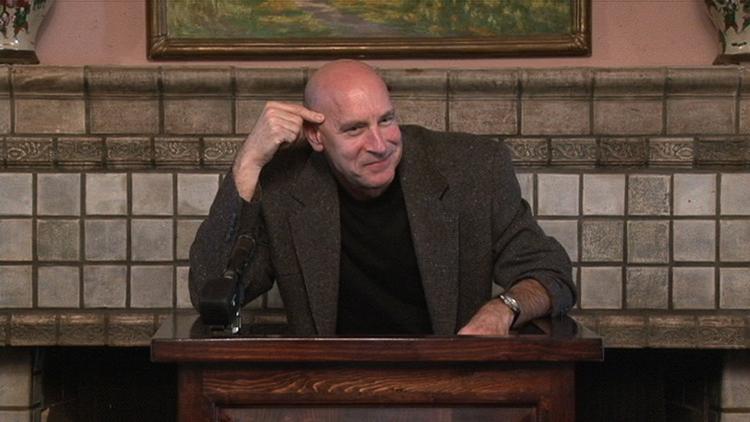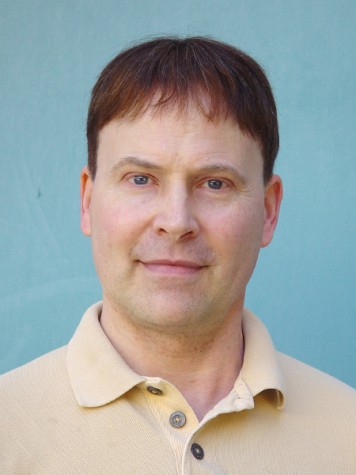The antique-laden Ruskin Art Club in L.A.’s posh West Adams district turned out to be a fitting venue for the Eclipse literary journal poetry reading presented by the Red Hen Press on Nov. 13.
Seven poets and one fiction writer recited their works to a full house. More than 50 people gathered in the elegant living room with a quaint atmosphere.
“I get the feeling that lots of past writers’ souls still congregate here,” said Eclipse founder Bart Edelman, who has taught English at Glendale College for 36 years.
Edelman handpicked the eight readers to celebrate the journal’s 22nd anniversary. They ranged from the youngest emerging poet to the most seasoned veteran author.
Eclipse publishes mostly poetry but also fiction and an occasional one-act play. It has included writers such as Red Hen-published poet Gaylord Brewer and authors from Canada, Germany, Ireland, Israel and India.
One fifth of its pages are reserved for GCC student submissions.
“We really want students to submit their works, especially poetry and fiction,” said Edelman. “A good poem has a clear voice, provocative use of words, language that makes you want to read it again, and a universal theme.”
Two of the presenting poets were from Glendale College. David Hovhannisyan, who has been published in three separate Eclipse issues, recited his 2011 poem “Yankee Rose” with the refrain: “Abandon hope and let addiction reign.”
The poem embraces indulgence: “Impulsive actions breathe to entertain, / discharging blood with new viscosity” (Eclipse 2011).
Student Mary Estrada, whose work appears in two issues, read “The Leaden Hour” about the death of her 19-year-old son.
“To live is like a grave that grows no flower […] With sips then gulps of grief, you taste the sour […] I know a place to shun the leaden hour” (Eclipse 2009).
Audience member Stephen Taylor, who teaches GCC’s creative writing workshop, said he was especially moved by the poem and liked all the readers.
For students who want to write and read, Taylor’s advice is: “Do it. Trust your material and keep working. I think it’s necessary for writers to learn to read [publicly].”
Eight of his creative writing students attended the Ruskin for extra credit, and some commented that they actually learned from listening to the readings.
“Things we talked about in class really came to life for them,” he said.
English major, Courtney Luengo, 21, said a high-quality poem should have a good voice and an interesting topic. Aviation major, Edgar Gasparyan, 23, said idea, arrangement and tone are all very important.
“If you write and read what you know, it comes through as genuine,” said creative writing student MaryAnn McGann, 53. “Take a chance and write about what you’ve lived through.”
Six of the readers were professional writers who were fortunate enough to be chosen out of the 5,000 submitions each year with the hope of being published in Eclipse.
As each reader prepared to speak, a respectful hush would fill the room. Though some poets were very soft-spoken or lightning fast, audience members seemed satisfied to glean whatever phrases they could catch.
William Archila, whose family fled El Salvador in 1980, read his bleak poems with an articulate rhythm and subtle rhyme scheme. The somber mood of being a stranger in a strange land rinsed out any optimism that may have been hovering in the decorative hall supported by massive mahogany beams.
He spoke of schoolmates, soccer teammates and lifelong neighbors that had wound up dead on the streets of El Salvador during the civil war. His tone was so serious that the art club guests hung on his every word.
“…by the roadside a woman / will moan over the body of a man / shrunken, stretched on the earth, that God / will finger the forehead of a dying country” (“The Art of Exile” 2009).
English major Nick Gilbert, 21, who especially liked Archila, said, “I could tell he was real about living it. He had just the right amount of character.”
To give the 90-minute poetry reading event some breathing room, Edelman put a short story reader in the middle.
“A good, provocative story should provide a clear set of conflicts and be so beautifully written that you feel as though you’ve just seen a movie right before your eyes,” he said.
Having condensed an 4,500 word story about missing cat “Billy” down to 1,800 words, fiction writer Rolf Yngve rifled through the text to squeeze it into his 10-minute time slot. He called himself a “fiction-eer” to distinguish himself from the
poet wordsmiths.
“I was hoping no one would compare my work with their artistry. I build with a hammer, these poets build with golden thread,” he said.
“For me, reading a great story is like becoming a child again: eagerly taken by the hand to enter through an irresistibly beautiful door, and then led into a room full of familiar and strange wonders where you are both entertained and disturbed.”
Comic relief was provided by Cal State Long Beach professor Charles Harper Webb, who used excepts from the movie “Jackass” in a poem. His poetry book “Amplified Dog” was published by Red Hen in 2006.
“Reading makes you a better writer because you are more aware of the impact your words really have,” he said.
Former student Amy Cordero said, “Compared to reading a poem, when you’re at a reading, you can actually feel what the writers intend. When you read on your own, you put your own ideas into it. For example, Douglas Kearney was so animated it made me feel in a different place.”
Kearney, author of “Fear, Some” (Red Hen Press, 2006) and “The Black Automaton” (2009) closed out the reading explosively with two awkward subjects: “Miscarriage” and “Lil’ Monkeys,” a theatrical poem in which he mocks racism.
Kearney said he knew he was destined to be a poet by age 22.
“I decided I wasn’t as interested in telling stories or finding out what happens to a character as I was about really investigating how language works with its sound and sense.”
He advised writers not to get caught up in writer’s block or reader’s cringe.
“Writing and reading are part of the same continuum,” he said. “They have to feed each other. It’s not a product and a consumer. It’s a dialog; it’s a discourse.”
Judging by the ample applause for each author, this reading was a dynamic experience for all.
Afterward, books were available to buy and free refreshments were served. Authors were glad to sign books and chat.
Managing editor Kate Gale said, “I like working at Red Hen because I am working to change the world, and I’m crazy about good books.”
Edelman’s newest book of poems published by Red Hen, “The Geographer’s Wife,” is due out in February.
Creative writing student/accounting major, Amanda Fear, 31, said she was above all motivated by her poetry prize-winning role model Lory Bedikian.
Before she began reciting her poetry, Bedikian, who is married to Archila, addressed the poets in the audience:
“Go for your dreams because they are possible to achieve with hard work and dedication.”


